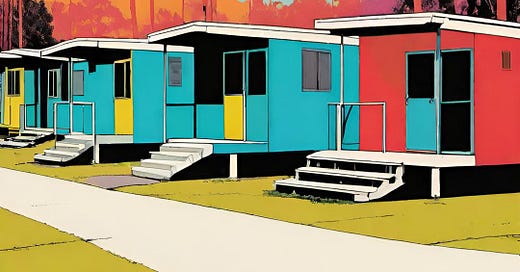“Somehow at some point” Part 2
Why do paid homeless advocates align with gentrification goals instead of their vulnerable clients?
“Somehow at some point” parts 1 and 2 were originally published together by CityWatchLA in their newsletter on December 5th, 2024.
I’m Ruth @roofless and I write about homelessness and housing in the City of Los Angeles. I’ve lived on the streets here continuously for seven years and first experienced displacement in 2003. I write a Substack series with USC whistleblower Zachary Ellison about the legal landscape of landlessness in LA. Zach has made himself a fixture in the courtroom of U.S. Judge David O. Carter, where major settlements affecting the unhoused like LA Alliance, addressing our civil rights and compelling “bed” creation, are enforced. In another settled lawsuit overseen by Carter, veteran plaintiffs led by Jeffery Powers sued the V.A. over illegal leases and insufficient housing at the West LA Soldiers’ Home.
In part 1, I dove into the most recent Powers hearing and revisited a 2019 displacement of veterans from Echo Park which coincided with a near-cessation of veterans’ housing voucher awards. In part 2, I interrogate top-paid homeless advocates for aligning with gentrification goals over housing and healing and suggest a simple solution.

The Raid on the Lake
In March 2021, two years after the 2019 closure of the Billets cottages and just one mile away, tranquil Echo Park Lake resembled somewhat of a war zone. LAPD swarmed in helicopters overhead and formations of riot cops unconstitutionally placed dozens of members of the press including L.A. TACO’s Lexis Olivier-Ray and Spectrum’s Kate Cagle in flexcuffs. They brutally concussed a housed civilian, putting them in the hospital and broke one protestor’s arm. LAPD’s raid of Echo Park Lake, which happened during the COVID-19 pandemic, ultimately displaced around 200 unhoused people, although some temporarily made it into shelter through Project Roomkey at the downtown L.A. Grand Hotel, three miles away, while people nearby in Skid Row were passed over for those same rooms. LAPD’s overkill response cost the City around $2M.
The closure was a violent, expensive and unnecessary show of force, decommissioning the entire park from all public access for two months, and arresting it behind rented chain link fences for more than two years. CD13 Councilman Mitch O’Farrell, whose district included Echo Park and Hollywood, was unseated in 2022. His loss was attributed to unsatisfactory leadership during the pandemic, including his brutal handling of EPL. His successor Hugo Soto-Martinez finally removed Echo Park Lake’s gentrification fences in May 2023. Some speculated that the rental fence was possibly due for return by then, anyway. It’s unclear just how many veterans may have been displaced in the EPL operation, but documented outreach regarding Economic Impact Payments conducted by National Veterans Foundation “NVF” on May 26th, 2021, just two months after the raid, shows that at least one unhoused veteran, Marvin, was found at EPL as soon as it reopened.
LAHSA’s lack of Authority
Heidi Marston, CEO of LAHSA at the time, made an appearance at EPL during the raid. She handed people cardboard boxes to aid in their moves to nowhere (or possibly serve as their new homes?). Knock.la’s Jamie Loftus reported Marston’s delayed reaction, quoting her regrettably musing:
“…it didn’t need to happen this way.”
If only the Los Angeles Homeless Services Authority had exercised any actual authority, such as instructing LAPD to stand down, demanding Sanitation back off of their clients while outreach worked to find them housing, attending City Council during LAMC § 41.18 hearings, or opposing the Recreation and Parks Department’s plans to close the public park in a pandemic, things really could have ended differently.
A lot of people showed up in incredible ways to show solidarity with the unhoused of EPL in March 2021. But many people failed the community, too. Marston’s job as the top-paid homeless advocate in the region should have given her a little more confidence to robustly oppose the violence done to her clients rather than wishing things happened differently.
Interestingly, Marston had worked as an executive for the VA prior to coming to LAHSA as a Chief Program Officer just two months before the veterans were removed from The Billets. Marston had worked for the VA in different capacities since 2009 and for a period worked as an assistant to the VA Secretary in DC. Her transition to LAHSA and exit from the VA are both listed as occurring in February 2019 on LinkedIn. Did Marston bring the Gateways contract to LAHSA? If she did, she knew exactly what she was doing, because she would soon be rewarded with a promotion to CEO.
Displacements don’t happen in a vacuum.
Gentrification pressures had been growing for years in Echo Park, with developers exploiting the “substantial remodel” loophole to evict multigenerational families from rent-controlled buildings. The “renoviction” removal mechanism was finally addressed by Housing and Homelessness Committee and City Council in November, thanks to tenant advocacy by Echo Park’s Mohawk Tenants.
Young Mohawk tenant organizer Matthew Mata and his family pleaded not to have to relocate from Echo Park for his senior year of high school. Mohawk’s supporters packed City Hall dressed in red, with some describing through translators during public comment experiences of being threatened with eviction as many as three times in the past few years under the now-closed legal loophole.
The Billets should have been studied and replicated for its ability to accommodate veterans, who some consider to be among the most difficult-to-serve clients because of their complex needs compounded by warranted distrust of the system. By managing to convert the majority of participants into residents of permanent housing, despite post-traumatic stress, serious mental illness and substance abuse, The Billets seemingly overcame the challenge of “acuity” in homelessness services, at least when it came to LA’s veteran population. Acuity has since been contemplated in the LA Alliance for Human Rights v Los Angeles court hearings. Unhoused people “with serious mental illness” are considered inappropriate for City shelters in the settlement. Alliance was filed in March 2020, right at the onset of the pandemic, and settled in 2022. It is overseen by the same judge as Powers, David O. Carter, himself a Vietnam veteran and double UCLA alum.
At the most recent Alliance hearing, the flag-draped tent across from the new federal courthouse was similarly addressed by the plaintiffs, to justify their demand for an evidentiary hearing. It didn’t go over too well, but an audit of spending on homelessness was demanded by the court, which is currently being conducted by firm Alvarez & Marsal and expected to deliver answers by February 2025.
Conflicting understandings of “harm” in court
On November 13th, the VA said it will be irreparably harmed if forced to add 100 modular housing units on-site. Plaintiffs’ lawyers said unhoused veterans (not named plaintiffs, who are now housed) will die. The VA’s lawyers wanted to know which ones, and the plaintiffs’ lawyers pointed to a 2,000 “by-name list” of unhoused veterans who they allege are connected to outreach or services, as well as the flag-draped tent near the courthouse. The West LA VA “Soldier’s Home” currently accommodates only around 300 veterans in housing on its property, and it formally objects to the Court wanting the VA to add 100 more units on-site by February, which would increase its housing capacity to around 400.
Does the VA mean it can’t federally subsidize those proposed units and will be forced to pay “out-of-pocket” for operating them, so it won’t be a profitable venture for the VA? Is that really irreparable harm that can be compared with the physical, mental and mortal costs of homelessness?
The truth is of course murkier than that, as the VA is expressing reluctance to accept what is essentially a packaged deal to implement a controversial Master Plan at the Soldier’s Home which includes retail development. The shopping component, which will open the Veterans’ property in West LA up to the general public, has an expedited timeline of two years, placing it at a higher priority than permanent housing for veterans. The VA may experience irreparable harm if it swaps out one group of illegal tenants (currently UCLA, the Brentwood School, Bridgeland Oil and SafetyPark are occupying the VA on leases that were deemed void by the Court) for another set of leases which also does not principally benefit unhoused disabled veterans and their families.
The U.S. Department of Veterans Affairs, the defendant in Powers, has a $400,000,000,000 annual budget. If the VA isn’t acting in bad faith by challenging the court’s opinion, it must substantially improve housing conditions for veterans.
The VA can, on its own initiative, take action to better accommodate veterans who live or wish to live at the Soldier’s Home at any time. It can open up Building 22, which once served as a dormitory for veteran families with children. It can identify funding from its own massive budget to replace the Pallet shelters with a more dignified product like a FEMA trailer (what happened to the >600 FEMA trailers Governor Gavin Newsom sent to Los Angeles to shelter unhoused people in January 2020?), 3D printed solutions (a local Culver City company has a promising design), modular homes, or anything else. The VA in West LA could invite Habitat for Humanity to build on-site, allow veterans who are able to build or fix homes for one another through the HUD’s Self-Help Home Ownership “SHOP” program (which grants $25,000 per unit for the creation, acquisition or improvement of “non-luxury” housing units through “sweat equity”). Instead, the experience for veterans who come to West LA in need of housing is consistently a story where the buck is passed to veterans’ nonprofits which receive grants yet have nothing to offer veterans. The practice of privatizing veterans’ housing is wasteful and only destabilizes and deprives veterans of their benefits.
The VA should, first and foremost, strike a deal with UCLA for use or acquisition of the dormitories it built at the VA on the C & H tract on Veterans Avenue, across from the cemetery. It may just find itself in compliance with the Judge’s orders for the creation of both temporary and permanent housing if it can use or acquire those existing dorms.
Rejecting the Master Plan doesn’t have to mean rejecting disabled veterans who are in need of housing and support. In fact, many veterans are themselves actively opposed to the Master Plan or components of it like the public retail mall. If the VA can unite with Veterans by supporting their housing needs, it may also be able to defeat the developers who have advanced so far on a land grab that may soon be impossible to undo.
The VA needs to do whatever it takes to help veterans, as they were expected to do to protect our country.
Additionally, to prevent deaths of veterans this winter, the VA should designate outreach of their own who has access to capital for troubleshooting solutions that directly benefit veterans and their families at and around the West LA VA, Venice and Skid Row. They should be able to book hotels, repair RVs, allocate safe parking spaces, upgrade tents and sheds, order medical devices and approve accessibility features as well as improve the old buildings, all from a discretionary account specifically for the purpose of facilitating literal longevity for veterans.
Originally published in CityWatchLA on December 5th, 2024. Stay tuned for part two or read the entire article here at the canonical link.
Illustrations made from prompts on Wombo’s free Dream.ai app for iOS.
Special thanks to those who sacrificed for our country, including my relatives who fought fascists in World War II, and the young unhoused veteran who spoke to me at length, condemning war and America’s violence on Veteran’s Day last month.








